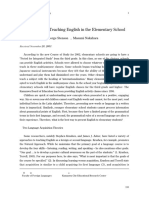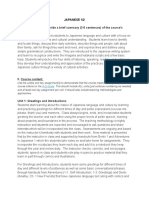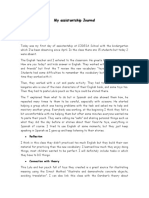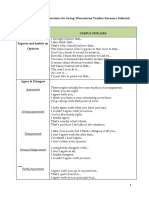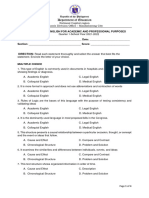Gakuin Dayori No. 18: "This Month Motto: Be Nice To Your Friends."
Gakuin Dayori No. 18: "This Month Motto: Be Nice To Your Friends."
Uploaded by
MazMohCopyright:
Available Formats
Gakuin Dayori No. 18: "This Month Motto: Be Nice To Your Friends."
Gakuin Dayori No. 18: "This Month Motto: Be Nice To Your Friends."
Uploaded by
MazMohOriginal Description:
Original Title
Copyright
Available Formats
Share this document
Did you find this document useful?
Is this content inappropriate?
Copyright:
Available Formats
Gakuin Dayori No. 18: "This Month Motto: Be Nice To Your Friends."
Gakuin Dayori No. 18: "This Month Motto: Be Nice To Your Friends."
Uploaded by
MazMohCopyright:
Available Formats
Gakuin Dayori No.
18
This Month Motto: Be nice to your friends.
Message from the Principal
It has passed one month, since the new school year
started. By now the new students must have been
acquainted with their teachers and the classmates enough to
be able to enjoy studying Japanese language. Or is this just
my wishful thinking. Amazingly the children in the
Preschool participated in the class showing no sign of
hesitation from the first day of the class. Some of them are
showing remarkable signs of growth even, compared to the
last year.
The higher graders seem to have built a good
teamwork for studying Japanese together. The Life Culture
Class for the higher graders is the continuation of the
Japanese Language Class in the first hour, and they are
studying what they cannot do in the first hour due to
shortage of time, namely to learn how to use Chinese-
Japanese dictionaries, how to write compositions, or
studying the structure of Kanji, etc.
The lower graders have Japanese Language Class
in the first 50 minutes, and in the second 50 minutes they
apply the four basic skills of Japanese language to various
activities (which are not identical to just crafting). For
example, the pupils of the First Grade make bubbles
through science experiment. 1. Listen to the instruction on
the way to make bubbles. 2. Understand the instruction
thoroughly, then take actions. 3. Play with what one has
made. 4. Students are encouraged to have imagination in
the play, and to recall spontaneous words they had in the
imagination. (Please read the comments that the First
Graders made on the bubbles.) Write down on cards
sentences that are made with the imagination words.
Finally play Karuta with these cards. Those four basic
skills of Japanese language are applied to these serial
operations. Since there is a limit of endurance among the
lower graders we must use different kinds of teaching
materials for them in order to enhance their language ability.
The Life Culture Class for the Second and Third
Graders is engaged according to their age.
What our school aims at with the Culture Class is
in general speaking to become able to learn Japanese with
fun, because learning would be more fun, if the students
understand what they are doing; coming to the school
would be more fun, if the school is a fun place; and when
they come to the school, interesting Japanese study is
waiting for them.
If you have any questions or opinions in regard to
the Japanese education or the school life in general, we
would appreciate to hear from you directly. Pleas contact
the class teacher, Takaki or Kasahara.
Contact:604-619-6221/604-856-6765 Alice Takaki
604-437-1481 Osamu Kasahara
Congratulations to Naoki-kun
We were told at the beginning of this year that
Naoki Kitano, Grade 10 student, of a weekday class student,
has achieved the highest mark of 99% in the BC Provincial
Examination, which was held last June. We believe this is
the result of his strenuous effort in studying Japanese since
he came to Canada when he was six years old. This is good
news that would encourage other students in our school as
well. Congratulations to you, Naoki-kun.
Osamu Kasahara, Grade Nine/Ten Class Teacher
Our Classes
This time we would like to introduce Preschool,
Grade One, Grade Two-A and B classes.
Preschool Class
In the Preschool class children are instructed with
rhythmic, Hiragana (reading), and crafting as the three
major pillars. These children are fond of singing and
dancing so much that it is rather chaotic in these activities.
We use picture cards and work sheets, but they are only
supplementary to raise their interest. We hope we can
make it a fun class through playing with the children.
Rieko Ishii, Preschool Teacher
Grade One Class
In this class every body is working on the study of
Japanese with fun and friendliness to each other. In the
Japanese language class we are studying the basics of
Japanese Alphabet. Some of the pupils are already able to
write them, but I am instructing them to pay attention to
places where stretching, sweeping-up and stopping
strokes are required.
In the Life Culture Class the emphasis is made on
enriching their Japanese language skills, by adding
curriculum science, social study and music for the Grade
One. I look forward to seeing their eyes brightened for
further growth.
Issued on Saturday, October 4, 2003
By Vancouver Academy of Japanese Cultur e
info@vajc.com ph./fax: 604-437-1481
In the Life and Culture Class we are making
Karuta. Let me show off some examples of their work:
A for Aisukuriimu Doko-doko Nee Doko (Tou)
Sa for Sakura-ga Suki Kodomo-wa Sakura-ga Suki
(Tyrus)
Se for Sekken-wa Aoi-kara Sora Mitai-yo (Midori)
1These are simple expressions of their honest feelings. It
is planned to complete with the las t letter n of the
alphabet by the end of November.
Hitomi Takagi, Grade One teacher
Grade Two A
This class is consisted of four students: energetic
Yuta-kun who is skilful at Kanji and gives a great effort in
reading, an exemplary student Kenzo-kun who always
deals with the tasks aggressively, Kia-kun who surprises his
classmates with unique ideas, and Leena-san who
vigorously treats the tasks with fine hand-writing.
Takashi Sugawara, Grade Two A Teacher
Grade Two B
Uwa-a, Dorae-mon is here, said one joyous child
when he opened the textbook. I will read, volunteered a
child in the game of Kanji Karuta. Another child was
concentrating all her attention into the writing, after she
declared to make herself able to write new Kanji without
copying. I sincerely hope that they keep learning with
these attitudes and treasuring these feelings. As goes a
saying What one likes, one will do well, they will grow
rapidly when they keep being interested in learning
Japanese.
Ikuko Kawai, Grade Two B Teacher
Soroban
Reading, writing and Soroban (calculation) are the
most fundamental skills that one has to master during the
childhood. The more one studies Soroban, the higher the
ability of ones calculation with or without abacus rises.
Soroban is also effective in nurturing ones mathematical
mind, logical thinking and concentration as well as
memorization. In our Soroban class of this school I would
like to guide the students with two basic axes, namely
instruction on how to move fingers and training of the
finger movement through repetitive practice.
Understanding and cooperation of their guardians will be
greatly appreciated.
Takashi Yamaguchi, Soroban Instructor
Calligraphy
A saying goes, The style is the man, but when
one examines what children write, it is fun when one can
see their character and their feelings through the
handwriting. While maintaining the priority of the joy of
writing for the children, I would like to instruct them
further, so that they can utilize the strength of the brush to
express powerfulness and carefree mind.
Osamu Kasahara, Calligraphy Instructor
Baton and Pompon Club
We started instructing this club in September. Our
instruction may be different from the last year instruction,
but we intend to make it a fun club adding to it pompon as
a new discipline. At first we do light stretching, then
practice basic skills of batons every Sat.. In the pompon
practice, held only once a month (the last Saturday of a
month), we begin with skipping and stepping. These basic
movements are so fundamental and important that we want
the students practice at home as well in order to fasten the
improvement. We believe that everyone in the club will be
familiarized with baton movements gradually. We
appreciate the help and cooperation from the guardians in
advance.
Miho Takeuchi & Kyoko Muramatsu, Instructors
From Mobile Library
We started lending books on the second week of
September. Books are available between 12:30 and 12:55
before the class as well as 3:15 and 3:40 just before class
end. In September we asked Mrs. Machiko Tajika,
Nanami-chans mother , to take charge of lending books as
well as other reception desk jobs. On behalf of all the
teachers we thank you very much for this. For the October
we asked Mrs. Naomi Takahara, Ryota-kun and Yoshiki-
kuns mother, to volunteer to take charge of lending books,
which she kindly accepted. Thank you very much in
advance.
If you are willing to take charge of lending
books, please contact Takaki or Kasahara. Thank you.
Request!
We are experiencing shortage of Soroban in the
Soroban class. If you have Soroban around you that are not
currently in use, could you kindly allow us to use it? If you
could donate it to the school, it will make us much happier.
Year Events
Oct. 11, Sat. Holiday for Thanksgiving Day
Oct.25, Sat. Mid-term Exam*
Nov. 01, Sat. Mid-term Exam*
Nov. 15, Sat. Parents-Teacher Consulting Day*
(Preschool, Grade One, Grade Two-A, Lev. 2)
Nov. 22, Sat. Parents-Teacher Consulting Day*
(Grade Two-B, Grade Five, Grade Six, Lev. 5)
Dec. 13, Sat. Class Presentation Day
Dec. 20, Sat. ~ Jan. 03, Sat. Winter Break
Jan. 10, Sat. Resuming Classes
Jan. 24, Sat. The End of the First Term, Report
Card
*In case the schedules changes, we would inform as soon
as possible. Please be advised that some of the Lower
Grade classes will put the marks of the students through
small tests that are held on every Saturday, instead of
having mid-term exam.
You might also like
- Writing Skill 6 PDFDocument128 pagesWriting Skill 6 PDFGaurav100% (10)
- TeachersmanDocument78 pagesTeachersmanotelaru75% (12)
- 80 20 JapDocument62 pages80 20 JapArindam Sen100% (2)
- Delta Module One Report June 2011Document66 pagesDelta Module One Report June 2011Alexandra Pantazi75% (4)
- Messages 3 Student's BookDocument145 pagesMessages 3 Student's BookValentina Kocoska60% (25)
- An Invitation To SuggestopediaDocument7 pagesAn Invitation To SuggestopediaKlaudia MarcuNo ratings yet
- Sanskrit Verbs and The Present System: Root Suffix EndingDocument2 pagesSanskrit Verbs and The Present System: Root Suffix Endingav2422No ratings yet
- Homework JapanDocument6 pagesHomework Japanafmsgdowd100% (1)
- Standard 9 ArtifactDocument5 pagesStandard 9 ArtifactAnonymous qIPUj8No ratings yet
- Te 845 EllteacherobservationDocument13 pagesTe 845 Ellteacherobservationapi-256944176No ratings yet
- Do Japanese Students Get HomeworkDocument6 pagesDo Japanese Students Get Homeworkewbp4y3s100% (1)
- Japan HomeworkDocument6 pagesJapan Homeworkafmsxohtq100% (1)
- Interesting Facts About Japanese School SystemDocument5 pagesInteresting Facts About Japanese School SystemJahara Mae CalmaNo ratings yet
- The Japanese Education SystemDocument4 pagesThe Japanese Education SystemNeil Trezley Sunico BalajadiaNo ratings yet
- March, 2010 Issue 8: Current EventsDocument6 pagesMarch, 2010 Issue 8: Current Eventsapi-26074801No ratings yet
- Action Research Lesson 1Document4 pagesAction Research Lesson 1api-273218316No ratings yet
- 2nd Year Tale For PrimaryDocument12 pages2nd Year Tale For PrimaryBea MsbNo ratings yet
- April 2010, Issue 9: Current EventsDocument6 pagesApril 2010, Issue 9: Current Eventsapi-26074801No ratings yet
- Page 3 PDFDocument1 pagePage 3 PDFCTIVVCVNo ratings yet
- Reading For The Imagination!: My Educational AutobiographyDocument7 pagesReading For The Imagination!: My Educational Autobiographyapi-315420745No ratings yet
- 2013 First NewsletterDocument3 pages2013 First Newsletterapi-240529328No ratings yet
- Current Events RIS Will Celebrate International Ozone Day On The 16 of SeptemberDocument6 pagesCurrent Events RIS Will Celebrate International Ozone Day On The 16 of Septemberapi-26074801No ratings yet
- Homework in Japanese SchoolsDocument5 pagesHomework in Japanese Schoolsafmsgdowd100% (1)
- G2 Newsletter - 9.3.12Document3 pagesG2 Newsletter - 9.3.12briony_venhoekNo ratings yet
- MEP1 Week13Document1 pageMEP1 Week13SitapatrNo ratings yet
- EP1 Sunny Week11Document1 pageEP1 Sunny Week11SitapatrNo ratings yet
- 2 - 0 - ks2 Newsletter 16sept16 2Document2 pages2 - 0 - ks2 Newsletter 16sept16 2Miracle MuokebeNo ratings yet
- The Japanese Education System1Document4 pagesThe Japanese Education System1Neil Trezley Sunico BalajadiaNo ratings yet
- Quiet Riot Comes To OES: L Listen I Include S Share A AppreciateDocument4 pagesQuiet Riot Comes To OES: L Listen I Include S Share A AppreciateKen KnickerbockerNo ratings yet
- JapaneseclassDocument5 pagesJapaneseclassapi-236997115No ratings yet
- Pursepages Edition1-2016Document3 pagesPursepages Edition1-2016api-253697680No ratings yet
- Teaching English in Elem Grade PDFDocument8 pagesTeaching English in Elem Grade PDFWella WilliamsNo ratings yet
- April NewsletterDocument5 pagesApril Newsletterapi-270802727No ratings yet
- How To Teach BeginnersDocument41 pagesHow To Teach BeginnersErika SudirgaNo ratings yet
- Set 2 - Teachers ManualDocument28 pagesSet 2 - Teachers ManualAkshara Foundation100% (4)
- Do You Have Homework Today in JapaneseDocument6 pagesDo You Have Homework Today in Japanesefvbcgxtif100% (1)
- Diary Teaching Punya BellaDocument3 pagesDiary Teaching Punya BellaBella RiskaNo ratings yet
- Say Goodbye To YakudokuDocument2 pagesSay Goodbye To YakudokuTuyet Quach AnhNo ratings yet
- Boucher September 25 2017 4th Grade NewsletterDocument4 pagesBoucher September 25 2017 4th Grade Newsletterapi-305864086No ratings yet
- Daily Plan-FinalDocument78 pagesDaily Plan-Finalapi-251029498No ratings yet
- Tangila Jahan - Personal StatmentDocument2 pagesTangila Jahan - Personal StatmentyooniverseNo ratings yet
- Class Observations: University of Banja Luka Faculty of Philology Department of English Language and LiteratureDocument8 pagesClass Observations: University of Banja Luka Faculty of Philology Department of English Language and LiteraturePrvovencaniNo ratings yet
- 9 MAS RECURSOS First Grade Parent Handbook - FinalDocument5 pages9 MAS RECURSOS First Grade Parent Handbook - FinalCorazon MotivadoNo ratings yet
- REVISED Essay Fo BISON MANAGEMENTDocument2 pagesREVISED Essay Fo BISON MANAGEMENTfrancyNo ratings yet
- Fast Phonics Infant I Teachers GuideDocument77 pagesFast Phonics Infant I Teachers Guidekanakarao1100% (3)
- Pup Tales Newsletter 1Document3 pagesPup Tales Newsletter 1api-250113714No ratings yet
- Newsletter 4-27-2012Document1 pageNewsletter 4-27-2012kaseytextorNo ratings yet
- Edsec477 Culturally Responsive Literary LessonDocument4 pagesEdsec477 Culturally Responsive Literary Lessonapi-436062804No ratings yet
- Hour #01 School Course Day Time Teacher ObservationsDocument6 pagesHour #01 School Course Day Time Teacher ObservationsSonsaku HakufuNo ratings yet
- AIE Final PDFDocument15 pagesAIE Final PDFSushila SuriNo ratings yet
- Narrative Summer Reading CampDocument5 pagesNarrative Summer Reading CampRowena Hunat Montenegro Lpt100% (2)
- EP1 Sunny Week7Document1 pageEP1 Sunny Week7SitapatrNo ratings yet
- September 2009, Issue 2 Current Events September 16 Was TheDocument4 pagesSeptember 2009, Issue 2 Current Events September 16 Was Theapi-26074801No ratings yet
- Narative Report: SEA-Teacher ProjectDocument9 pagesNarative Report: SEA-Teacher ProjectLatifaNo ratings yet
- Dec 5-9Document1 pageDec 5-9api-307228537No ratings yet
- Japanese 1 - 2 UC Course SubmissionsDocument9 pagesJapanese 1 - 2 UC Course SubmissionsSarah DickinsonNo ratings yet
- Epr Booklet2015 - ReadingDocument8 pagesEpr Booklet2015 - Readingapi-300894554No ratings yet
- Newsletter 11.2.12Document1 pageNewsletter 11.2.12kaseytextorNo ratings yet
- Cortneylollis Contextual FactorsDocument4 pagesCortneylollis Contextual Factorsapi-200969078No ratings yet
- My Assistantship JournalDocument7 pagesMy Assistantship JournalMicaela TuñónNo ratings yet
- EP1 Sunny Week8Document1 pageEP1 Sunny Week8SitapatrNo ratings yet
- KSSR Year 3 Lesson Plan (Language Arts)Document8 pagesKSSR Year 3 Lesson Plan (Language Arts)Nurhaidawati Hj RamliNo ratings yet
- Japan Homework HelpDocument5 pagesJapan Homework Helpg3n75kv3100% (1)
- BTSN Handout 4Document2 pagesBTSN Handout 4Donna SaitoNo ratings yet
- Japan Kit Inventory: Teacher'S GuideDocument2 pagesJapan Kit Inventory: Teacher'S GuideMazMohNo ratings yet
- Japanese Soroban Abacus: by Emi ZakoDocument1 pageJapanese Soroban Abacus: by Emi ZakoMazMohNo ratings yet
- Interview With Alan Johnston During The Installation of Intelligence, Tate Britain, 7/00Document4 pagesInterview With Alan Johnston During The Installation of Intelligence, Tate Britain, 7/00MazMohNo ratings yet
- Japanese Business EthicsDocument11 pagesJapanese Business EthicsMazMohNo ratings yet
- Abacus Summer CampDocument1 pageAbacus Summer CampMazMohNo ratings yet
- S 250 Nanotech 4Document2 pagesS 250 Nanotech 4MazMohNo ratings yet
- 2011 08 Stanford Explores LanguageDocument2 pages2011 08 Stanford Explores LanguageMazMohNo ratings yet
- Creative Brief: Project OverviewDocument2 pagesCreative Brief: Project OverviewMazMohNo ratings yet
- TrolfeDocument17 pagesTrolfeMazMohNo ratings yet
- National Center For Missing & Exploited Children: Position DepartmentDocument1 pageNational Center For Missing & Exploited Children: Position DepartmentMazMohNo ratings yet
- Designing A Programming Workshop For GirlsDocument4 pagesDesigning A Programming Workshop For GirlsMazMohNo ratings yet
- Roman NumeralsDocument3 pagesRoman NumeralsMazMohNo ratings yet
- HS08SBANDocument2 pagesHS08SBANMazMohNo ratings yet
- Towards The Design of Intelligent Educational Gaming SystemsDocument4 pagesTowards The Design of Intelligent Educational Gaming SystemsMazMohNo ratings yet
- Platforms For Agent-Based Computational Economics: Rob AxtellDocument25 pagesPlatforms For Agent-Based Computational Economics: Rob AxtellMazMohNo ratings yet
- Nusraat Masood CVDocument2 pagesNusraat Masood CVMazMohNo ratings yet
- WAUKESHA County Technical College Updates June 2013Document2 pagesWAUKESHA County Technical College Updates June 2013MazMohNo ratings yet
- Firetechcamp Camp InstructorDocument2 pagesFiretechcamp Camp InstructorMazMohNo ratings yet
- Scientific/professional CV:: Recognition of Intermodal Interference Images With The Use of Optimized HRWD and ANN, TalkDocument6 pagesScientific/professional CV:: Recognition of Intermodal Interference Images With The Use of Optimized HRWD and ANN, TalkMazMohNo ratings yet
- CS 3360 Practice 5Document17 pagesCS 3360 Practice 5MazMohNo ratings yet
- Ap08 Cs PeekingatProgramming TGDocument6 pagesAp08 Cs PeekingatProgramming TGMazMohNo ratings yet
- Master Schedule Camp 2014 Revised 6-16-14Document1 pageMaster Schedule Camp 2014 Revised 6-16-14MazMohNo ratings yet
- Session 3 PDFDocument10 pagesSession 3 PDFMazMohNo ratings yet
- msg00231 PDFDocument1 pagemsg00231 PDFMazMohNo ratings yet
- Common Language Functions For Group DiscussionsDocument2 pagesCommon Language Functions For Group DiscussionsDuygu ŞentürkNo ratings yet
- PASSIVE VOICE MATERI. New PDFDocument4 pagesPASSIVE VOICE MATERI. New PDFArbi Wahyu NNo ratings yet
- Architecture Syllabus PDFDocument69 pagesArchitecture Syllabus PDFtydgerNo ratings yet
- Activity Sheet For Grade 3Document10 pagesActivity Sheet For Grade 3SHAINE ANN BADILLANo ratings yet
- Skills For Effective Writing 1Document176 pagesSkills For Effective Writing 1Tin Tin Hla100% (4)
- What Spontaneous Humor Reveals About Language Comprehension Ying Choon Wu Cognitive Science, UCSDDocument26 pagesWhat Spontaneous Humor Reveals About Language Comprehension Ying Choon Wu Cognitive Science, UCSDZubaloNo ratings yet
- Pretest in EAPP Q1Document4 pagesPretest in EAPP Q1yozora00803No ratings yet
- Ch-23 (Official Language)Document6 pagesCh-23 (Official Language)ABHISHEKNo ratings yet
- Improving The Eighth Grade Students' Listening Comprehension - Specch and SeminarDocument10 pagesImproving The Eighth Grade Students' Listening Comprehension - Specch and SeminarRachma CantikaNo ratings yet
- Stages of Play Chart From The Autism Workbook CompressedDocument1 pageStages of Play Chart From The Autism Workbook CompressedEnkelena AliajNo ratings yet
- Worksheet Clasa 5ADocument2 pagesWorksheet Clasa 5ALivia Vitu DulapNo ratings yet
- Hel Sure Booklet It BDocument44 pagesHel Sure Booklet It BLilaNo ratings yet
- ArticlesDocument18 pagesArticlesHisyammudin RoslanNo ratings yet
- Kuliah 4 Esp Prot-AgroDocument3 pagesKuliah 4 Esp Prot-AgroLiza FebriaNo ratings yet
- Speaking SkillDocument30 pagesSpeaking Skillsafitri yaniNo ratings yet
- I-Guía Práctica SegundoDocument4 pagesI-Guía Práctica SegundoSimon CastilloNo ratings yet
- Passive VoiceDocument8 pagesPassive VoiceSpeak EnglishNo ratings yet
- Dominican Education System Op-Molo Learners' Module Holy Rosary Academy, Inc. Molo, IloiloDocument11 pagesDominican Education System Op-Molo Learners' Module Holy Rosary Academy, Inc. Molo, IloiloRaymart GalloNo ratings yet
- LK 1 - Lembar Kerja Belajar Mandiri-Modul6Document8 pagesLK 1 - Lembar Kerja Belajar Mandiri-Modul6IweNo ratings yet
- წიგნების ელექტრონული ვერსიების სიაDocument3 pagesწიგნების ელექტრონული ვერსიების სიაgiorgi kartsidzeNo ratings yet
- Classroom Language: and Check. Pictures. Listen and CheckDocument2 pagesClassroom Language: and Check. Pictures. Listen and CheckYurfre Barboza OréNo ratings yet
- PDF (TG) - RW 11 - Unit 17 - Lesson 3 - Considerations in Writing A Project ProposalDocument10 pagesPDF (TG) - RW 11 - Unit 17 - Lesson 3 - Considerations in Writing A Project ProposalomongoscharlynmaeNo ratings yet
- Q2-Literary DevicesDocument2 pagesQ2-Literary DevicesJasmine FatmaNo ratings yet
- Efl Student1Document87 pagesEfl Student1AntrikaNo ratings yet































